Original War Preview
We take a look at this real-time strategy game from recently resurrected publisher, Virgin Interactive.
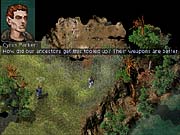
Virgin Interactive, defunct for years now in the United States, is attempting a comeback this winter. One of the first games leading its charge back into the gaming world is Original War, a game developed by Czech Republic developer Altar Interactive and published by Virgin. Original War is a real-time strategy game, but it has a unique position in the genre, with a setting and gameplay style that should set it apart from other games of its ilk when it releases here in the coming months.
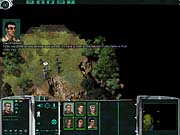
The story of Original War is a slight variation from other sci-fi RTS games. There is time travel, a world war, and an energy crisis, but the game manages to add enough of a twist to each element that the story is different enough to be interesting. In the near future, the United States and Russia are locked in world war. To make matters worse, an energy shortage threatens the future, and the United States is on the brink of destruction, owing to its lack of viable energy to power its infrastructure and military. Around this time, scientists discover a strange object buried in the earth's crust. It is a black pod with an archway for an entrance. After much poking and prodding, they discover that it is a time machine, and they christen it EON. This black, smooth stone object will be one half of the key to humanity's survival. The other half is a newly discovered mineral called siberite. Scientists researching EON also pull from the earth glowing green crystals that are warm to the touch. Although they aren't radioactive, they are volatile and packed with energy; even a sliver brings water to a violent boil. These crystals could solve all of America's energy needs. Unfortunately, the only place where siberite deposits exist is in Siberia, deep in the heart of Russia. The government, with time machine in hand, and eyeing the potential in siberite, devises a plan. It decides to send a team of special forces back to prehistoric Siberia, to a time before there was a Russia, or even humans. The place in time to which they jump is 2,000,000 BC, before the dawn of mankind. Without any opposition in this time period, the special forces are to then find and excavate the siberite and move it to Alaska, where they will bury it again, so that 2,000,000 years later, when siberite is discovered, it will be found in Alaska and not deep in the heart of Russia. Of course, when you jump back into time, you find that the Russians have already beaten you there, and a battle ensues in the Pliocene era to see who controls the siberite and the time machine.
As game stories go, it certainly is different. And it provides for a unique setting in the Pliocene era. You'll occasionally see woolly mammoths and Cro-Magnons skittering across the screen and will sometimes guard against saber-toothed tigers stalking your troops. The story also drives the gameplay, more so than in other games. In fact, Altar is promising to truly integrate story into gameplay like no other game has done before. Will it succeed? Read on to find out.
A Different Style of Gameplay
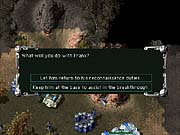
As soon as we started playing Original War we sensed something different. The game focuses on characters and sometimes gives you real choices as to how to proceed in missions. Mission objectives are often given to you by characters in the game and involve a smaller scope than rampaging through bases and taking out all enemy fortifications. Missions call for more tactical strikes than grand military campaigns. You'll still sometimes have to take on the enemy, but some missions will involve capturing facilities or scientists, while others might just call for you to evade enemy patrols. Moreover, missions can change, as objectives coming from headquarters change. Thus, your first objective might be to get behind enemy lines. When you do that, another message from base tells you to capture the enemy's supply depot. Once that's done, you're then asked to steal resources, and so on. It makes the campaign more natural, giving you the sense that the game is waiting on you, rather than the other way around, which happens with many other games where the missions and objectives are rigidly defined and linear. In Original War, the game twists and turns, and the illusion is that the game depends on you.

Your performance will also affect how future missions play out, and Altar promises branching missions and different endings depending on how you do in earlier missions. To make good on its promise of branching missions and story-driven gameplay, Altar is creating real choices in certain missions. In the very first mission, you're asked if you really want to enter the time machine or not. It's your choice. Of course, if you say no, then you watch a cutscene of you and your family huddling together as the Russians invade America. Say yes and the real game begins. Later on, there are more choices. A Russian civilian teleports into your base, and you are given a dialogue box that asks you whether you want to kill him, interrogate him, or let him go. Future missions may change depending on what you do during such critical junctures.
Aside from the mission structure, the gameplay is also different in other ways. You won't be building bases and churning out waves of units to throw at the enemy. In fact, you can't pump out infantry because in the Pliocene era, there are no other humans to train to fight. Everything comes from the future through the time machine, including your resources. The three resources are crates, oil, and siberite. Crates are sent from the future and appear at random on the screen. Your engineers then have to explore the map and bring those crates back to base, where they are used to create buildings and vehicles. Oil is used to power vehicles, which do run out of fuel and are then useless until refueled. Siberite, of course, occurs naturally during this time, but it isn't necessary until later in the game. Resources aren't really a focus of this game, not like they are in Age of Kings or Red Alert 2. Here, the scope is so small that you have something much more important to manage: your people.
Characters
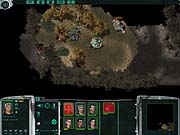
The key feature of Original War is its focus on characters, not units. Every "unit" you control in this game is a named human being. As the Americans, you play as Lieutenant John MacMillan, the hero of the American campaign. You'll travel back in time with other commandos and troopers, but the team is small, composed of only a handful of operatives. As you go from mission to mission, you'll carry over the same troops from your previous mission to the next. If you lose a man or woman, that person is no longer available, and your army is one soldier smaller for the rest of the game. Characters might join you in later missions, but keeping the people you have alive becomes increasingly important, especially because the army you control always stays small, even with additional reinforcements.
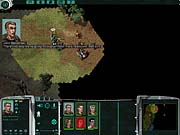
People are your most important resource in the game, and as you play through the missions, you'll have to manage their roles. Most humans come into the past as soldiers. However, there are four occupations in the game: soldier, engineer, mechanic, and scientist. Every unit has the potential to play all four roles. You change a unit's role by sending it into certain buildings. You can change a unit into an engineer at the service depot, change it to a scientist at the laboratory, change it to a mechanic at the machine shop, and so on. You'll often have to cycle your units through various roles because you have only a limited number of people, perhaps only five or six during certain missions. So during the early game, when you need to scour the map to grab crates, you'll change all your people into engineers, but when you gear up for battle, you can then send them back to change into soldiers. The process is quick, which it has to be, since you'll be changing occupations often. Each role is important to the game. Soldiers are the only ones who fight, while scientists can heal your units--a vital role in this game where mortality carries more impact than in other games. Mechanics are the only ones who can repair and refuel vehicles, which are very powerful in this game. When most of your army consists of a handful of soft infantry, any vehicle becomes a highly sought prize.
The game also has a heavy role-playing element, and after each mission, you'll earn experience points and advance in level. At each level-up, you'll get to add skill points to the four skills, which naturally reflect the four different roles. So you could improve your fighting skills, engineering skills, mechanical aptitude, or scientific knowledge. Eventually, you'll create people who are better at certain roles than others. How you use a unit also helps define its role. If you have one character building structures, his skill in engineering will improve automatically, even if he is just a soldier helping the primary engineering. When you level up and add engineering points to him, he'll be even more capable at this line of work if you choose to change him into an engineer. While the difference between one level and the next isn't that pronounced, as you climb much higher in level, you will find that your characters are much better at what they do. This, coupled with the fact that you have so few people, makes you even more guarded in how you use them.
Final Thoughts

The emphasis on characters and the reduced number of units really make Original War stand out from the rest of the real-time strategy games. Each character is a precious resource in this game, because there are so few characters to go around, because each character can play all four of the game's occupations, and because each character improves over time. If anything, though, gamers might become too cautious, as losing a man is devastating in this game. At the very least, the emphasis on characters and role-playing elements will almost certainly make gamers more attached to their characters. It's a nice departure from other RTS games where units are just fodder. Here, every single unit is truly important.
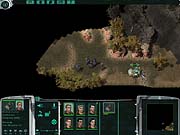
Unfortunately, if Altar is going to emphasize the characters so much, it has to make them more interesting. Currently, the voice acting is terrible. Although the game has already been out in Europe for some time, let's hope Virgin Interactive can take the time to change and improve the acting for the US release. Everything in this game is a cliché. There's the mewling private, the hard-nosed general, the Russian defector who loves hamburgers, and your own character, who's basically a carbon copy of every World War II movie hero you've ever seen. While the plot isn't terrible, the writing is, and coupled with the hammy voice acting, it conspires to create a barely tolerable situation. Though the game is fun, you'll cringe at the voices and the script.
The graphics, likewise, aren't spectacular. This game is 2D and sometimes doesn't provide enough contrast between environments. While there is an advantage to crawling through tall grass, it is hard at first to see the difference between tall and regular grass. Moreover, the ambient creatures, with the exception of easily recognizable ones like the saber-toothed tiger, are sometimes hard to discern, and they look more like moving blobs than anything else. The graphics and animation for the characters are also too simple at times, with not enough differentiation between engineers and soldiers.
Virgin definitely needs to improve the voice acting, and the graphics in their current state won't impress too many gamers, but the game itself could be fun. It has originality, and its focus on characters and their changing roles adds a new element to real-time strategy gameplay. The role-playing elements only further cement this game's emphasis on character management and small-scale battles, and to the game's credit, they give this game a certain appeal that other RTS games don't have. There is more emotional investment in your characters here than in other strategy games, which makes this game seem more like a Jagged Alliance than a Command & Conquer. And with the open mission structure and other gameplay mechanics, it should have enough interesting features to provide a good break from the usual RTS fare.
Got a news tip or want to contact us directly? Email news@gamespot.com
Join the conversation